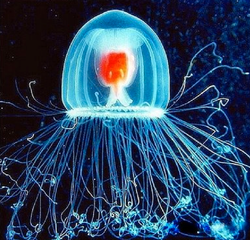 By: Cassi Kirkland Watch television or browse the media for about one hour and you’ll see at least one advertisement for anti-aging cosmetics. There are firming creams, wrinkle repair serum, pore vanishers and even emerging lines for men. We are a culture obsessed with youth, and we go to extremes to extend our lives and look young. But with all of our technology, we have not come up with something to rival the power of Turritopsis nutricula, a species of jellyfish called “immortal” by scientists. While we struggle to make ourselves live longer and look younger, Turritopsis regenerates on its own as a response to stressful environments. In a crisis, an adult jellyfish undergoes transdifferentiation, a process by which cells transform into different types. This process is similar to functions of our stem cells, but with much more unlimited possibility. Sure, the word “immortal” is enticing, but what does it really mean? Looking at this in terms of the human lifespan, this is the equivalent of developing backwards into a fetus and then being reborn again. Would you still be the same person? The answer is complicated. Yes, your cells would be genetically identical to the adult cells you were born from, but what about your personality, memories, and thoughts? Jellyfish are much simpler creatures, without brains and central nervous systems, so applying this “immortality” to humans isn’t so straightforward. Perhaps a more realistic concern is how these jellyfish could potentially take over the ocean. They have traveled all around the world, mostly through ship ballast water in trade barges. They are even showing different traits in different environments, which begs the question: how will marine diversity be affected by an organism that doesn’t die? As of now, little is known about how Turritopsis nutricula knows the “secret of immortality,” and even less is known about how this biological phenomenon can benefit humans. But is immortality something humans should chase? Those of us who spend countless dollars trying to look young and live longer would probably say yes, but considering ethical and philosophical questions might lead us to a different conclusion. (image link: http://wilsonkhoo.files.wordpress.com/2013/02/immortal-jellyfish2.png)
0 Comments
Leave a Reply. |
WELCOME, UMICH SCIENTISTAS!
CAMPUS PICS
WHAT'S NEWUPCOMING EVENTSPAST POSTS
October 2022
SORT BY TAG |
The Scientista Foundation, Inc. All Rights Reserved © 2011-2021 | Based in NY | [email protected]
The Network for Pre-Professional Women in Science and Engineering
The Scientista Foundation is a registered 501(c)(3) -- Donate!
The Network for Pre-Professional Women in Science and Engineering
The Scientista Foundation is a registered 501(c)(3) -- Donate!


 RSS Feed
RSS Feed